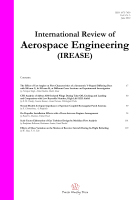


Home > Archives > Latest issue
|
International Review of
Aerospace Engineering (IREASE) December 2013 (Vol. 6 N. 6) 
|
by Alena N. Kniazeva, Vladimir А. Kukareko
Abstract - A new methodology is proposed in the article for finite-element modeling and calculation of stress-strain characteristics of representative volumes of precipitation-hardening alloys, which contain inclusions of a strengthening phase. The methodology allows to take into account elastic interphase deformations, which take place at the interphase regions of the alloys under consideration. These deformations are results of specific volume mismatch of matrix and inclusion phases. The proposed methodology was used for modeling and calculation of stress-strain characteristics and elastic properties of a representative volume of the typical precipitation-hardening Ni-Cr-based alloy. It was shown that elastic interphase deformations increase significantly the level of stresses in the alloy under consideration. But they don’t influence considerably on elastic properties of the material. The proposed methodology may be used for modeling and calculation of stress-strain characteristics and mechanical properties of alloys, which contain strengthening particles. Copyright © 2013 Praise Worthy Prize - All rights reserved
Keywords: Elastic Interphase Deformations, Precipitation-Hardening Alloy, Representative Volume, Finite Element Modeling, Elastic Properties.
by Hamza Benzerrouk, Hassen Salhi, Alexander Nebylov
Abstract - In this paper, comparison of adaptive and robust non Gaussian sensor fusion INS/GNSS is proposed to solve specific problem of non linear non Gaussian time variant state space estimation with impulsive measurement noise, different algorithms are proposed based on the most recent approaches in non linear filtering during intentional and non intentional interferences caused by multiple sources, or by the GNSS receivers signal degradation. Non linear filters such as Extended Kalman filter EKF and the last developed Cubature based Kalman Filter are implemented to estimate the navigation flight states for UAV. A specific hypothesis assumes high non Gaussian scenario and low non Gaussian noise level. Especially, alpha stable impulsive noise is simulated and affects GNSS measurement. The modern non linear filter algorithm called Cubature Kalman Filter CKF which provides more accurate estimation with more stability in Tracking data fusion application is compared with conventional non linear filters under non Gaussian constraints as a first step, thus, additional hypothesis is introduced which consists on Gaussian measurement outliers of each non Gaussian densities. In our work, Gaussian sum filtering and adaptive fading algorithms are proposed to solve the problem of IMU/GNSS integration in denied environment. CKF is compared with EKF in ideal conditions and during GNSS impulsive interferences modeled as non Gaussian noises “Sum of Gaussian” supposed to occur during specific interval of time, during the same interval, we assume additional denied environment which consists on the vari\ation of the Gaussian sum noise covariance, then, innovation based adaptive fading approach is selected and used to modify the covariance calculation of the parallel non linear filters performed in this work. Two important results are carried out depending on the variation of the Gaussian mixture density modeled in this work. original results are observed, discussed with real perspectives in navigation data fusion for real time applications under multiple denied environment conditions. Copyright © 2013 Praise Worthy Prize - All rights reserved
Keywords: MEMS, GPS, GNSS, Kalman filtering, CKF, Gaussian Sum , Alpha-Stable Noise, Adaptive Fading.
by Ying Xia, Sutong Liu, Jiangfan Feng
Abstract - Map data modeling is one of the key technologies of positioning and navigation. Hierarchical map data structure which is integrated with traffic sign information is designed based on the navigation geographic data model for autonomous navigation of the intelligent vehicle. The application example shows that the model can express road network topology subtly, and establish the association between the road network and traffic rules easily. It can not only provide static path planning by analyzing the road network structure, but also combine with the traffic sign recognition technologies to assist the intelligent vehicle to achieve dynamic navigation. Copyright © 2013 Praise Worthy Prize - All rights reserved
Keywords: Intelligent Vehicle, Traffic Sign Recognition, Navigation Map Model.
by Y. Meddahi, K. Zemalache Meguenni, M. Tahar, M. A. Larbi
Abstract - In this paper, we present the robust control of a dirigible airship. In the first part of this paper, kinematics and dynamics modeling of autonomous airships is presented. Euler angles and parameters are used in the formulation of this model and the technique of Backstepping control is introduced. In the second part of the paper, we develop a methodology of control that allows the dirigible to accomplish a prospecting mission of an environment, as the follow-up of a trajectory by the simulation who results show that Backstepping control method is suitable for airships. Copyright © 2013 Praise Worthy Prize - All rights reserved
Keywords: Autonomous Airship, Blimp, Backstepping Control, Lyapunov Function.
by S. Swain, P. S. Khuntia
Abstract - In this paper an extended SIMC PID controller is designed for an unstable angle of attack of a FOXTROT aircraft and then its stability is tested for a particular range of perturbation values. The robust stability for the above system is tested analytically and graphically using Kharitonov Stability Criterion. Further it was established that not only the designed controller along with the plant is stable but also robust stable while the aircraft flies with different speed. Copyright © 2013 Praise Worthy Prize - All rights reserved
Keywords: Robust Stability, Kharitonov Interval Polynomials, Frequency Sweeping Function, Extended SIMC.
|